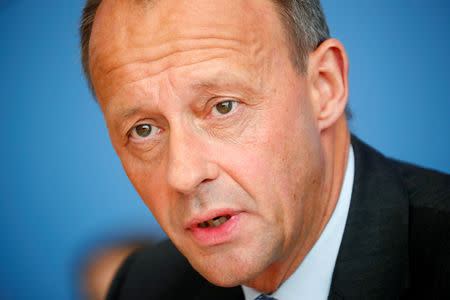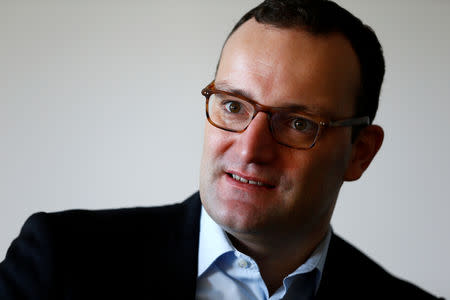Conservative contenders vie to overturn Merkel's centrism
By Thomas Escritt
BERLIN (Reuters) - Two leading contenders to replace Angela Merkel when the German chancellor bows out as leader of the Christian Democrats set out their stalls on Wednesday, promising to give new definition to a party grown centrist over her two decades at the helm.
Merkel, who has shaped European politics over her 13 years as chancellor, announced this week that she would step down as party leader after her conservative bloc suffered two painful election setbacks within a month.
While Merkel has declined to back a successor, she would find it easier to continue as chancellor if a fellow centrist, like party general secretary Annegret Kramp-Karrenbauer - dubbed the "mini-Merkel" - were to triumph.
But the party's conservative wing, which has increasingly chafed at the compromises forced upon them by a leader who has often seemed most comfortable governing with parties well to their left, now sees an opportunity to grab back the reins.
In his first news conference since returning to front line politics after a decade in the wilderness, Friedrich Merz, a 62-year-old lawyer, outlined an unapologetically pro-business agenda, describing himself as a reform-minded pro-European.
"I am a convinced economic liberal, a social conservative and a socially engaged person," said Merz, who 15 years ago lost out to Merkel in the battle to run the party. "That's what has made the CDU strong."
Among the tasks of a CDU he led would be reclaiming voters who had deserted it for far right parties and coming up with a more detailed response to French President Emmanuel Macron's proposals for deepening European integration.
"He deserves a more substantial response from Germany," Merz said. "The biggest challenge for Europe in coming years is holding the euro zone together."
MAKE THE CDU DISTINCTIVE AGAIN
He was answered minutes later from the party's socially conservative wing by Health Minister Jens Spahn, 38, whose pitch, in an article for the Frankfurter Allgemeine newspaper, focused on the 2015 migrant crisis that ultimately proved Merkel's undoing.
Warning of the "mainly male" migrants who continued to stream into Germany's big cities three years after Merkel's decision to open Germany's borders to more than a million refugees from war and poverty in the Middle East and Africa, he called for tighter asylum and immigration laws.
The number of new arrivals in Germany has fallen sharply this year, partly due to stricter border controls across Europe as well as tighter asylum rules in Germany and other countries.
"We have to limit and direct that flow" of immigrants, he said, arguing that the party had grown amorphous in its readiness to ally in government with parties from across the left and right.
One risk to the party of moving to the right would be that of breaking its existing coalition with the Social Democrats (SPD), who are smarting at a series of disastrous election outcomes and many of whom are already itching for the freedom to tend their wounds in opposition.
Pushing the CDU more to the right could, however, also allow the SPD to win back centrist voters in the coming years.
For the CDU's right-wing, another risk is that two right-wing candidates could steal each other's votes, allowing Kramp-Karrenbauer to win, especially since another Merkel ally, North Rhine Westphalia premier Armin Laschet has decided not to run.
Merz, currently non-executive chairman of asset manager Blackrock's German division, could also be hurt by his association with financial services sector.
Blackrock "aren't carpetbaggers," he added, distancing himself from the kind of predatory capitalism that is unpopular in socially minded Germany.
(Writing by Thomas Escritt; Editing by Michelle Martin, Mark Heinrich and Richard Balmforth)



